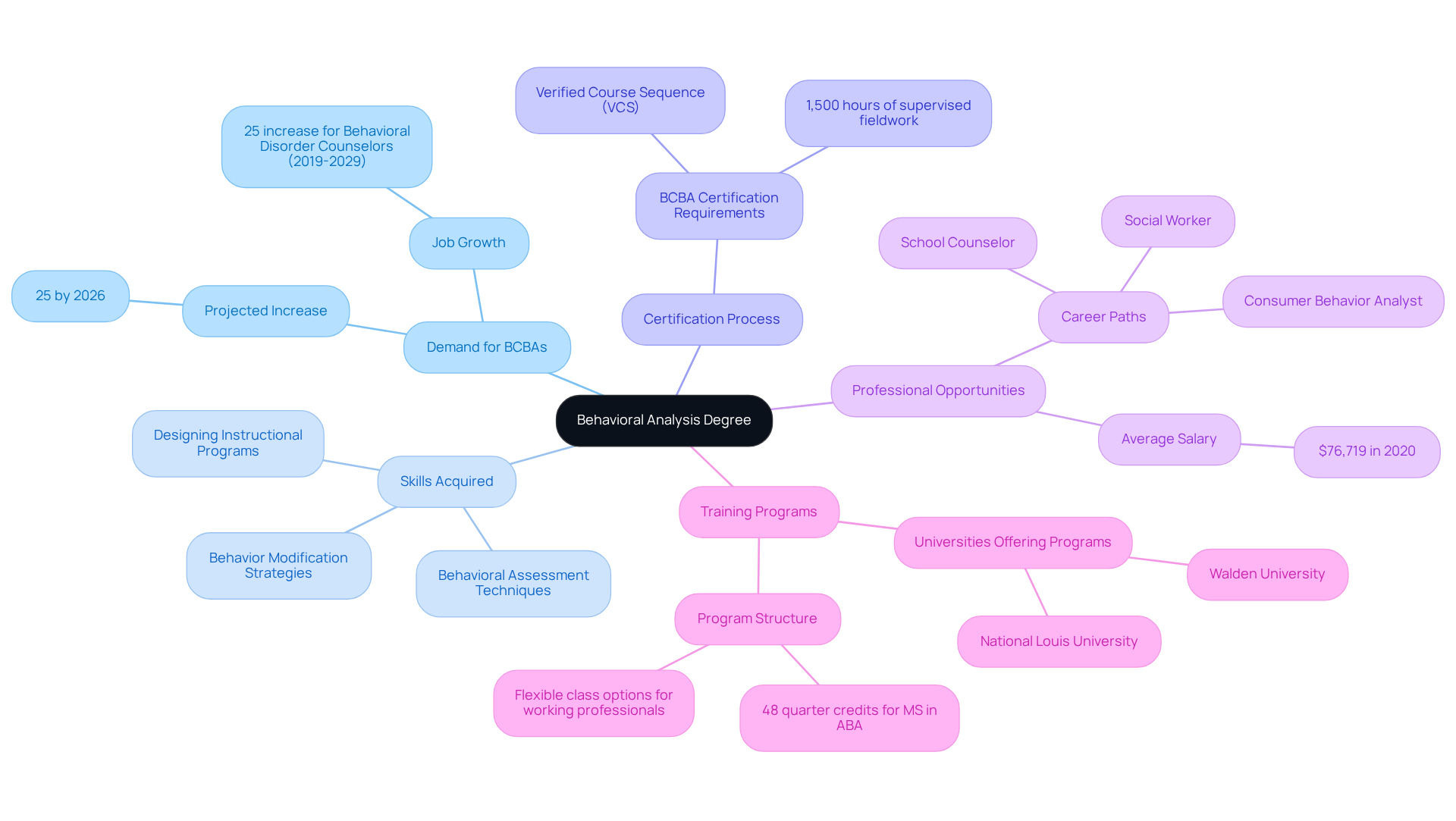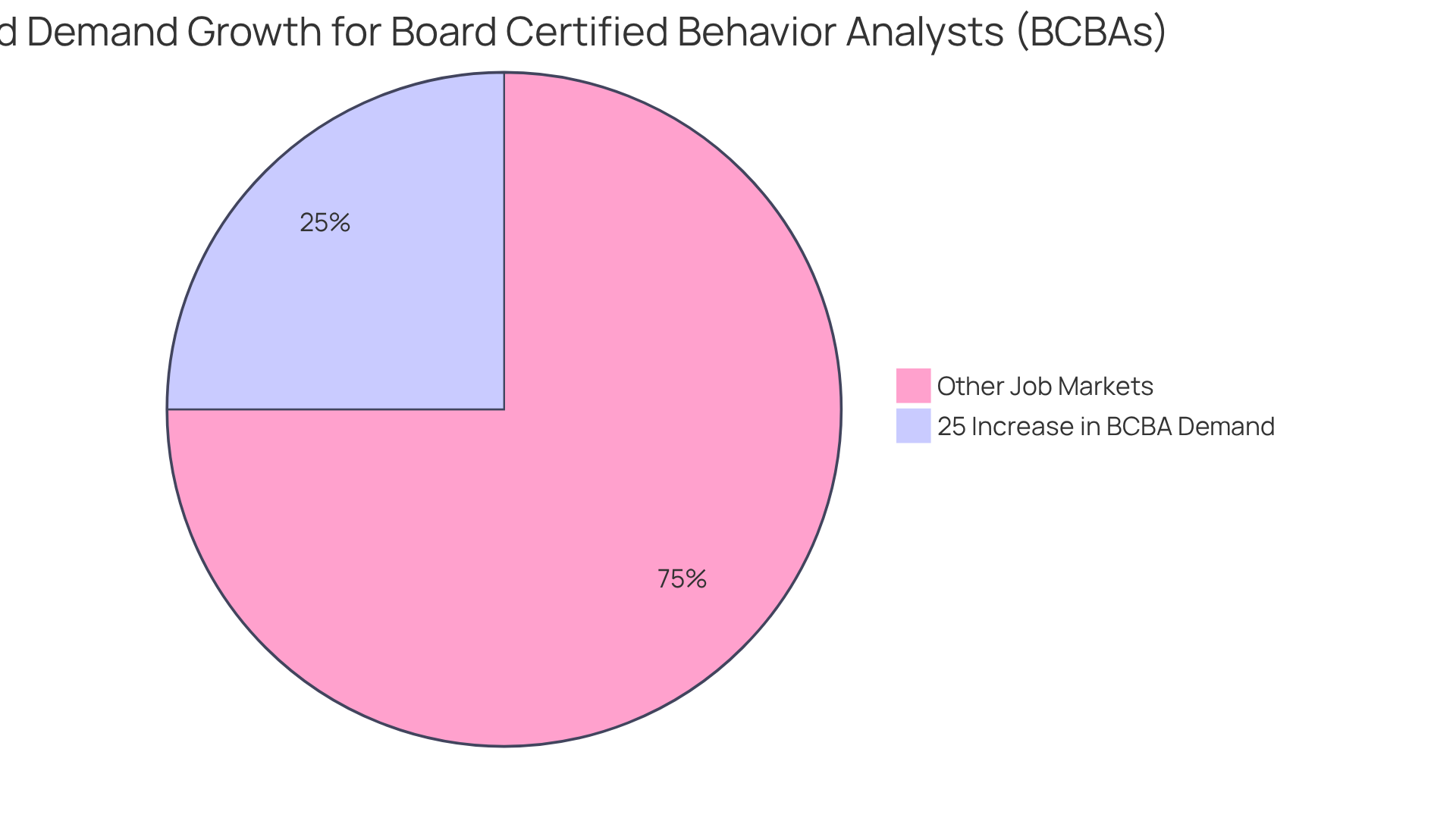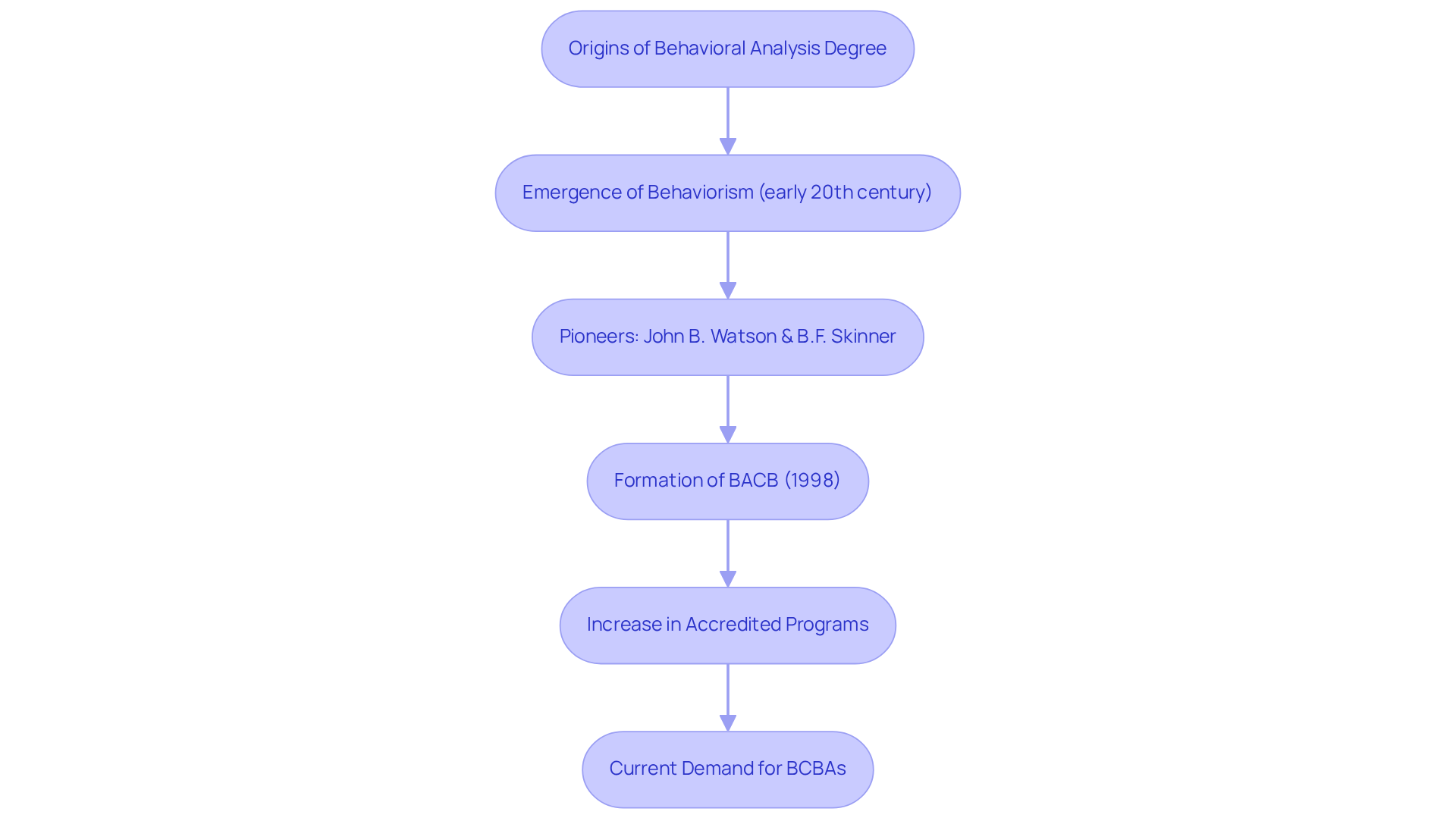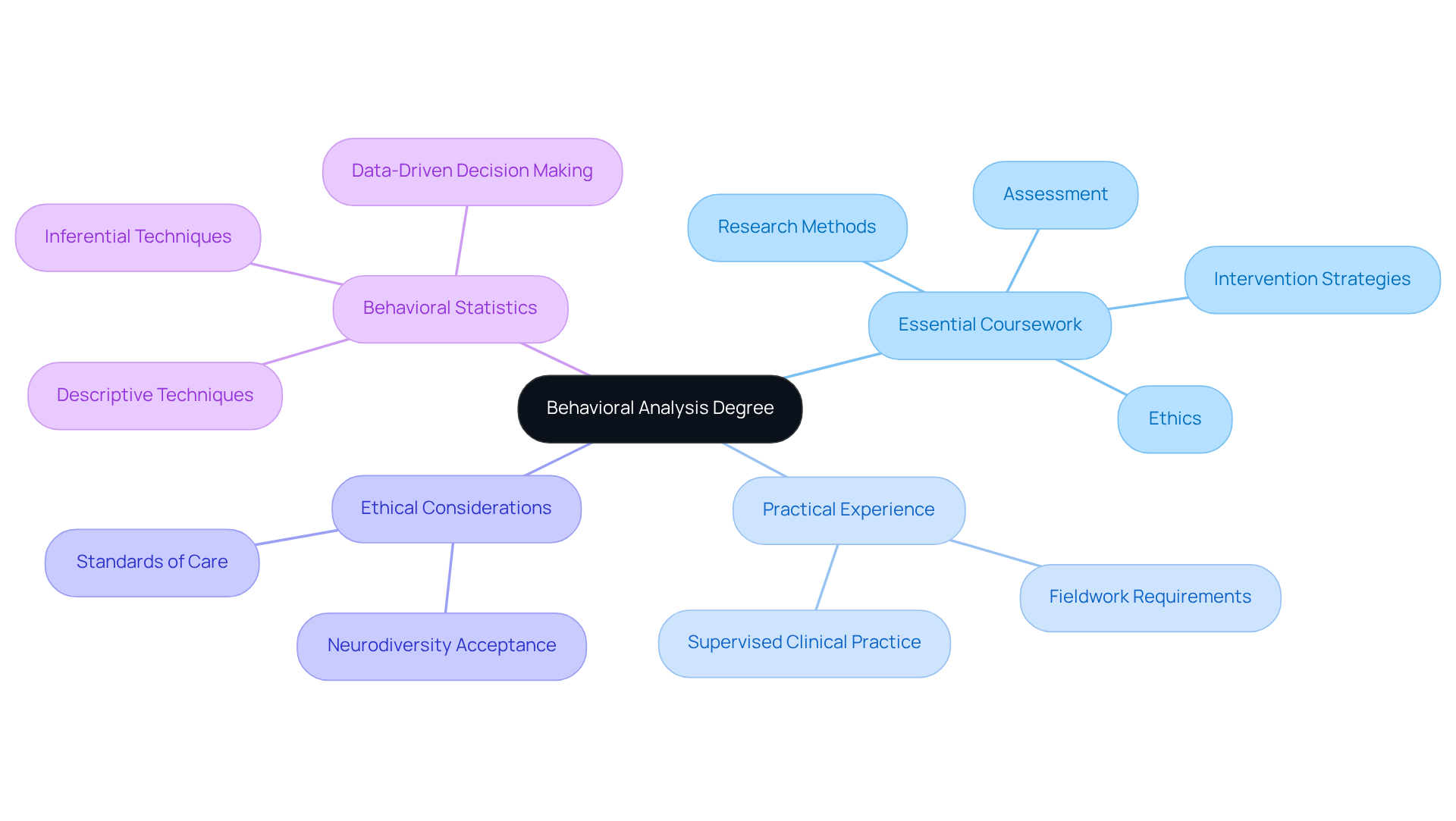June 27, 2025

The article highlights the growing demand for Board Certified Behavior Analysts (BCBAs), emphasizing the significance of a behavioral analysis degree in this context. With the projected job growth in the field, this degree plays a crucial role in equipping graduates with essential skills for effective practice in Applied Behavior Analysis (ABA) therapy. As educational programs in behavioral analysis evolve, they prepare individuals to meet the increasing needs of the profession.
Are you facing challenges in hiring qualified professionals? The behavioral analysis degree not only provides theoretical knowledge but also practical skills that are vital for successful ABA therapy. Graduates emerge ready to make a meaningful impact in their roles, backed by a solid understanding of behavioral principles and ethical practices.
In conclusion, the importance of a behavioral analysis degree cannot be overstated. As the demand for BCBAs continues to rise, investing in this educational pathway ensures that the next generation of professionals is prepared to excel in the field. Consider how Hire ABA can assist you in connecting with these qualified candidates, providing a reliable solution to your hiring needs.
The increasing demand for Board Certified Behavior Analysts (BCBAs) signals a pivotal moment in the field of Applied Behavior Analysis (ABA) therapy. Projections indicate a remarkable 25% surge in job opportunities by 2026. As professionals navigate this evolving landscape, a behavioral analysis degree emerges as a critical qualification, equipping graduates with essential skills to assess and modify behaviors effectively.
However, with the growth of the field comes the challenge of ensuring that aspiring analysts receive comprehensive training that meets the rigorous demands of this impactful profession. What key features and historical context of this degree must aspiring professionals understand to succeed in their careers?
The demand for is projected to surge by 25% by 2026, making a an increasingly vital qualification for those aspiring to enter this field. This specialized academic program delves into the , a scientific discipline that investigates the interplay between behavior and environmental factors. Encompassing studies in psychology, behavioral science, and , this degree equips graduates with the skills necessary to evaluate and modify behaviors across diverse settings, including healthcare, education, and social services.
Graduates frequently pursue , which necessitates 1,500 hours of , thereby unlocking numerous in various sectors. Currently, many universities, such as Walden University, offer programs in the study of behavior, reflecting an increasing recognition of its significance in addressing and promoting positive outcomes for individuals with developmental disorders.
The comprehensive training provided by these programs, which includes evaluation methods and programming design, not only enhances career prospects but also significantly improves the overall . Are you facing challenges in hiring qualified professionals? Consider how the right , like that offered by a behavioral analysis degree, can effectively meet your needs.

The demand for Board Certified Behavior Analysts (BCBAs) is projected to increase by 25% by 2026, which makes obtaining a an essential qualification in the field of . This degree equips professionals with the vital skills necessary to perform , design , and implement strategies that foster . ABA therapy is recognized for its effectiveness in treating and other developmental disorders, highlighting the importance of this qualification in making a significant impact on the lives of those in need of .
Moreover, staying informed about new opportunities in ABA therapy can lead to and flexible working conditions. This allows BCBAs not only to advance their careers but also to influence more lives positively. Are you currently facing challenges in hiring qualified professionals? Consider how can address these issues and support your recruitment efforts effectively.
In conclusion, serves as a crucial stepping stone for individuals aiming to excel in this rewarding field. Embrace the opportunity to enhance your team with skilled BCBAs and make a lasting difference in the lives of individuals requiring behavioral support.

The demand for is projected to rise by 25% by 2026, highlighting the urgent need for (ABA). The origins of the can be traced back to the early 20th century, coinciding with the emergence of behaviorism—a psychological approach that prioritizes observable actions over internal mental states. Pioneers like John B. Watson and B.F. Skinner laid the groundwork for conduct study as a scientific discipline. Over the years, this field has evolved, leading to the establishment of structured educational programs focused on conduct evaluation.
In 1998, the formation of the Behavior Analyst Certification Board (BACB) marked a pivotal moment, further professionalizing the field and setting standards for certification. Since then, the number of accredited programs offering a [behavioral analysis degree](https://felician.edu/academics/school-of-education/graduate-programs/applied-behavior-analysis-aba-and-autism-studies) has steadily increased, reflecting the growing recognition of this critical area of healthcare. Today, is a recognized pathway for individuals aiming to enter the .
As you consider your hiring needs, ask yourself: are you equipped to meet the rising demand for BCBAs? The growth in this sector underscores the importance of a behavioral analysis degree in equipping individuals for . Leverage platforms like to connect with qualified candidates who can address your organization's challenges effectively.

The represents a critical pathway in the field of , including essential coursework in assessment, intervention strategies, ethics, and research methods. Are you aware of the growing demand for ? This behavioral analysis degree provides students with the necessary skills to apply analysis principles in real-world situations, emphasizing the importance of to inform treatment choices. A significant focus is placed on ethical considerations, ensuring that graduates are prepared to uphold the highest standards of care in their practice.
Moreover, practical experience through is typically mandated, allowing students to implement their knowledge in clinical or educational environments. This comprehensive curriculum not only addresses challenges but also empowers graduates to make to the field. Notably, working as an applied analysis specialist often necessitates a behavioral analysis degree, highlighting the .
The further enhances students' capabilities by equipping them with essential statistical techniques relevant to behavioral research, fostering data-driven decision-making skills. Influential figures in the field, such as B.F. Skinner, have emphasized the importance of . Contemporary discussions on and accommodation in treatment approaches.
It is crucial to recognize that a significant percentage of programs require fieldwork, reinforcing the practical training aspect of the degree. As you consider your hiring strategies, reflect on how the expertise of graduates from this program can elevate your practice.

The demand for Board Certified Behavior Analysts (BCBAs) is soaring, making a behavioral analysis degree a pivotal qualification for those eager to make a significant impact in the field of Applied Behavior Analysis (ABA) therapy. This degree not only equips individuals with essential skills but also opens doors to numerous professional opportunities. The comprehensive training provided through this program prepares graduates to effectively assess and modify behaviors, thereby enhancing the quality of care in mental health and related fields.
Key aspects of the behavioral analysis degree include:
The degree encompasses rigorous coursework in assessment, intervention strategies, and ethical practices, complemented by practical fieldwork experience. This multifaceted approach ensures that graduates are well-prepared to navigate the complexities of behavioral support and contribute positively to the lives of individuals with developmental disorders.
As organizations face increasing demand for qualified BCBAs, it is essential to consider how they can leverage the expertise of behavioral analysis graduates. Are you prioritizing the hiring of professionals with this specialized education? By doing so, organizations can not only meet their staffing needs but also foster meaningful change in the communities they serve. Embracing the significance of a behavioral analysis degree is not just a strategic move; it is a commitment to enhancing the quality of care and support for those who need it most. Take action now and consider how Hire ABA can assist in finding the right talent to elevate your organization.
What is a behavioral analysis degree?
A behavioral analysis degree is a specialized academic program that focuses on the principles and practices of action examination, investigating the relationship between behavior and environmental factors. It includes studies in psychology, behavioral science, and applied behavior modification (ABA).
What is the job outlook for Board Certified Behavior Analysts (BCBAs)?
The demand for Board Certified Behavior Analysts (BCBAs) is projected to increase by 25% by 2026, highlighting the importance of a behavioral analysis degree for those entering this field.
What skills do graduates of a behavioral analysis degree acquire?
Graduates acquire skills necessary to evaluate and modify behaviors in various settings, including healthcare, education, and social services.
What certification do graduates often pursue after obtaining a behavioral analysis degree?
Graduates frequently pursue Board Certified Behavior Analyst (BCBA) certification, which requires 1,500 hours of supervised fieldwork.
What types of institutions offer behavioral analysis degree programs?
Many universities, such as Walden University, offer programs in the study of behavior, reflecting the growing recognition of its importance in addressing behavioral challenges.
How does a behavioral analysis degree improve career prospects?
The comprehensive training provided by these programs enhances career opportunities and significantly improves the overall quality of care in mental health.
In what sectors can graduates of a behavioral analysis degree work?
Graduates can work in various sectors, including healthcare, education, and social services, addressing behavioral challenges and promoting positive outcomes for individuals with developmental disorders.
Our expert recruitment strategies and AI-driven sourcing ensure that you receive top-notch candidates quickly, without compromising on quality. Whether you’re looking for BCBAs, Clinical Directors, or RBTs, we’ve got you covered.